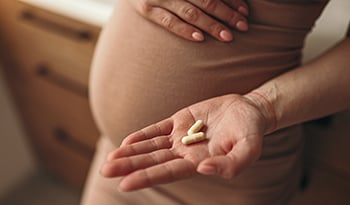Pielęgnacja osobista dla kobiet: Dlaczego produkty organiczne mają znaczenie

Czym są produkty higieny osobistej dla kobiet?
Produkty higieny osobistej dla kobiet obejmują tampony, podpaski menstruacyjne, chusteczki, spraye, płyny do płukania, pudry i balsamy.
Problem
Tak jak coraz więcej konsumentów jest zaniepokojonych dodatkami chemicznymi w żywności, kosmetykach, pielęgnacji skóry, detergentach do prania i płynach do zmiękczania tkanin, tak rośnie popularność organicznych lub wolnych od chemikaliów produktów do higieny osobistej.
W ciągu całego życia kobieta może zużyć ponad 10 000 tamponów, podpasek lub innych produktów higieny osobistej. Ponadto nie istnieją żadne regulacje rządowe dotyczące toksycznych substancji chemicznych w produktach higieny osobistej dla kobiet. W rezultacie produkty te mogą być znaczącym źródłem narażenia, niosąc ze sobą istotne ryzyko dla zdrowia.[1,2]
Toksyczne substancje chemiczne: Na co zwracać uwagę
Lista potencjalnie szkodliwych substancji chemicznych znajduje się zazwyczaj w produktach do pielęgnacji kobiet.[1,2]
Niektóre substancje chemiczne, które zaburzają żeński układ hormonalny lub są toksynami powodującymi przewlekłe choroby, obejmują:
- Pestycydy
- Ftalany
- Parabeny
- Syntetyczne substancje zapachowe
- Metale ciężkie (ołów, kadm i rtęć)
Dlaczego warto wybierać organiczne produkty higieny osobistej?
Ponieważ tkanka pochwy i sromu jest wysoce chłonna, tj. znacznie bardziej chłonna niż skóra, obecność substancji zaburzających gospodarkę hormonalną i innych toksycznych substancji chemicznych w produktach higieny osobistej stanowi poważny problem.[3] W szczególności stosowanie tamponów wiąże się ze zwiększonym stresem oksydacyjnym, prawdopodobnie z powodu zwiększonej ekspozycji na zanieczyszczenia środowiskowe zawarte w tych produktach. Wybieranie produktów o niższej zawartości toksycznych substancji chemicznych jest wysoce zalecane.
Na co zwrócić uwagę
Aby zmniejszyć narażenie na toksyczne substancje chemiczne, takie jak ftalany, parabeny, substancje zapachowe i inne składniki obecne w produktach do pielęgnacji domu i urody, ważne jest, aby kobiety dokładnie przeanalizowały swoje wybory dotyczące produktów do higieny kobiecej.
Szukaj marek i produktów, które ujawniają wszystkie składniki na etykiecie i unikaj tych z dodatkiem chemikaliów lub substancji zapachowych. A ponieważ wiele produktów higieny osobistej dla kobiet jest wytwarzanych z bawełny, która może być narażona na działanie pestycydów lub innych dodatków w procesie uprawy i zbioru, ważne jest, aby szukać certyfikatów ekologicznych na tamponach lub podpaskach na bazie bawełny.
Aby uzyskać certyfikat ekologiczny Departamentu Rolnictwa Stanów Zjednoczonych (USDA), produkty muszą być uprawiane bez użycia syntetycznych pestycydów i nawozów.
Podsumowanie
Produkty higieny osobistej dla kobiet, takie jak tampony i podpaski, mogą stanowić zagrożenie dla zdrowia ze względu na toksyczne substancje chemiczne. Wybór opcji organicznych może zmniejszyć narażenie na szkodliwe substancje. Szukaj produktów z przejrzystymi listami składników i certyfikatami ekologicznymi, aby nadać priorytet zdrowiu i dobremu samopoczuciu.
Referencje:
- Upson K, Shearston JA, Kioumourtzoglou MA. Produkty menstruacyjne jako źródło narażenia na chemikalia środowiskowe: przegląd z perspektywy epidemiologicznej. Curr Environ Health Rep. 2022; 9 (1): 38-52.
- Marroquin J, Kiomourtzoglou MA, Scranton A, Pollack AZ. Substancje chemiczne w produktach menstruacyjnych: Przegląd systematyczny. BJOG. 2023 Sep 24.
- Singh J, Mumford SL, Pollack AZ, et al. Stosowanie tamponów, chemikalia środowiskowe i stres oksydacyjny w badaniu BioCycle. Environ Health. 2019 Feb 11;18(1):11. doi: 10.1186/s12940-019-0452-z. PMID: 30744632; PMCID: PMC6371574.
WYŁĄCZENIE ODPOWIEDZIALNOŚCI:Celem niniejszej Strefy Zdrowia nie jest stawianie diagnoz...

















































































 Spis treści
Spis treści
















